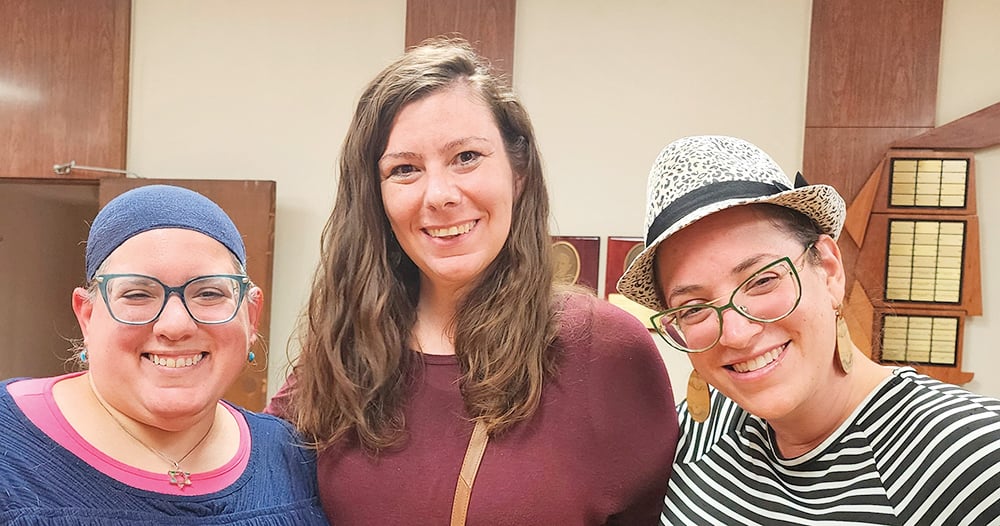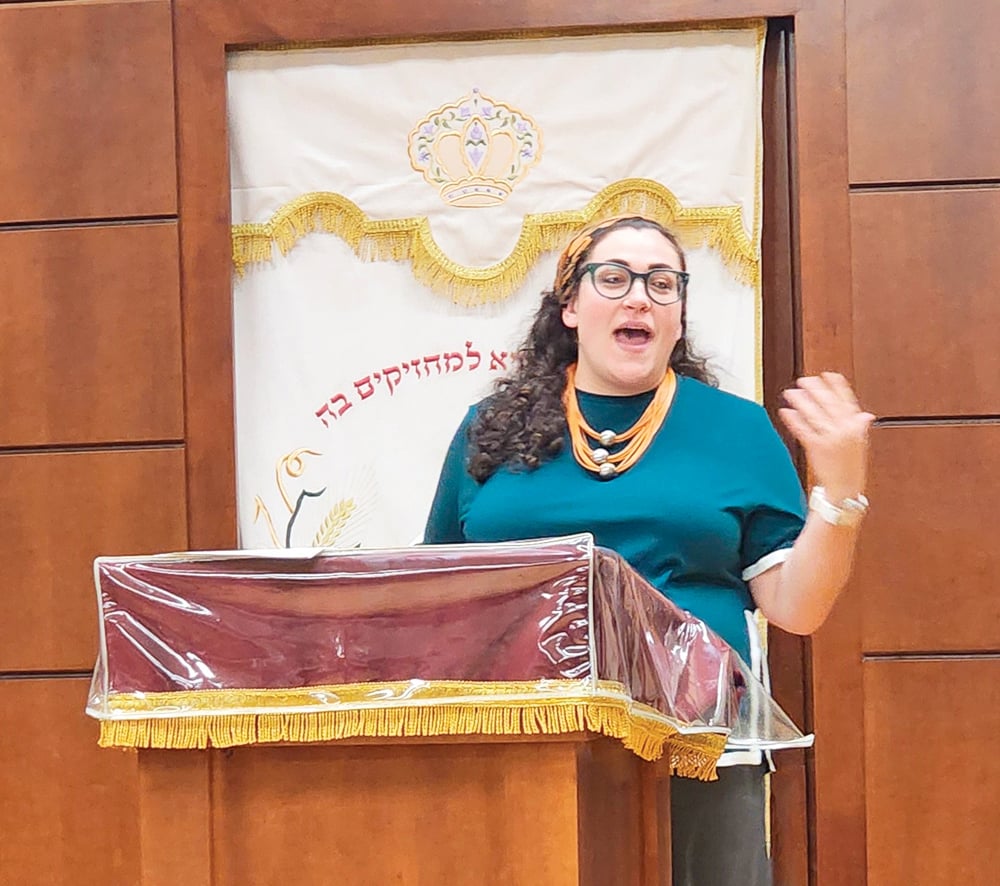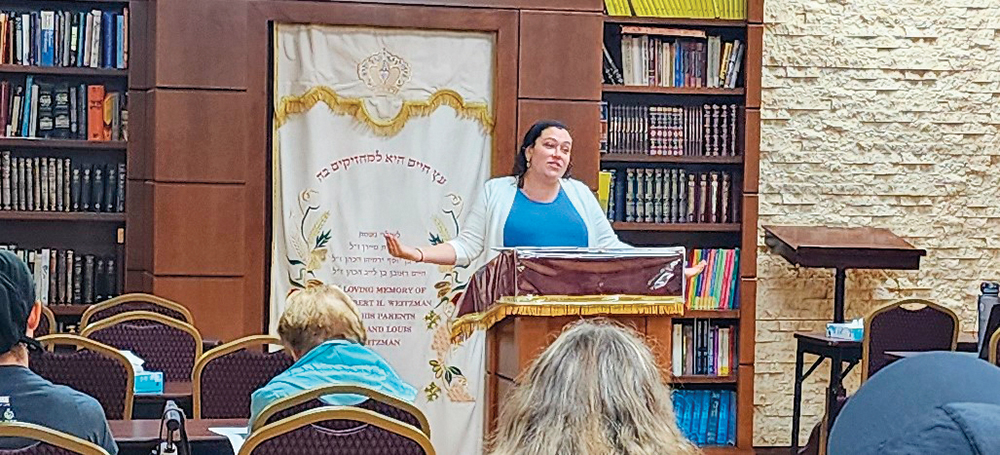
Anshe Chesed of Linden recently held a four-part series, “Israel as Idea: Israel as Reality,” facilitated by Dr. Rachel Slutsky, shul member and visiting assistant professor in the department of religion at Seton Hall University. The series presented an overview of various aspects of Israeli government, society and politics followed by discussion during which participants analyzed hard, yet important, topics and allowed for multiple viewpoints, perspectives and the ability to be self-critical. Attendees covered topics such as “What ‘Does’ Support for Israel Look Like? What Should Support Look Like?”; “What Is Going on With the Haredi Draft Reform?”; and “Religious Nationalism in History and its Impact Today,” over a four-week period. A rotating group of people attended the discussions in person, and others via Zoom.
Linden’s Mindy Schaper described the sessions as “not the usual shiur, but very inspirational. We gained a comprehensive overview of topics that don’t usually get discussed and were able to also share our views.”
Slutsky says there are many community commonalities as well as a great deal of diversity of thought and opinion in the Modern Orthodox world. “We all love Israel, but there are nuances.” Some people may hold reservations about the way Israel operates. “We can have our opinions and discuss the ‘real-world’ consequences in an environment where we aren’t afraid to do so. It can be difficult to have a critical conversation of Israel when we are attacked from outside the community. We were also able to discuss whether the diaspora Jewish community has the right to criticize or offer opinions of what Israel does.”

Reuven Blau of Hillside came because the “fascinating topics covered conversations that don’t usually happen.” Das Zell of Linden came because “Rachel gave the presentations.” One attendee was pleased with the way the discussions helped overcome fear of criticism. Some people may feel uncomfortable criticizing Israel, but criticism can also be described as love in its highest form.”
What does support for Israel look like? Is it financial, emotional, cultural, religious, or political? Slutsky led the group through discussions asking whether there are conditions for support and how it felt to curtail support and whether criticism could be seen as a form of support. Should Jews voice their disagreements with Israel in public when there are so many people criticizing Israel for a variety of reasons? Active discussion in small groups allowed many varied views to be presented.
Another session discussed who should serve in the army, whether Israeli Arabs should be drafted and the role of Haredi men in the military. Do Diaspora Jews have a say in the outcome of these questions? There is no doubt that more troops are needed; the active duty soldiers and reservists fighting in the North and in Gaza are in need of rest, and there is growing resentment that some families sacrifice their children in war for the Haredi men who may not even be learning full-time. Some may see defense of Israel as described in the Torah as a milchemet mitzvah (righteous war) and an obligation of all citizens.
Slutzky noted that the exception for Haredi men was not written in the constitution in 1949—the exemption was a deal struck by David Ben-Gurion in exchange for political support. Although secular, Ben-Gurion sensed the loss of the destruction of the European yeshivas in WWII and wanted to insure their survival in the fledgling state. At the time there were only a few hundred people eligible for this exemption, and not the burden that it is today. Should Torah study continue to be their way of service? Should exemptions for full-time study be limited? Should Haredi men be assigned tasks that align with their beliefs, such as certifying kashrut, food preparation or medical tasks? Should funds to Haredi institutions be restricted if army enlistment doesn’t increase?
The last class discussed the role and history of religious Zionism and served as a connection back to the first topic. Basic love for the Land of Israel is instilled in American Modern Orthodox families and is present in liturgy, the Bible and philosophy. In Israel, Dati Leumi presents both a religious and political ideology. Abraham Isaac Kook, the first Ashkenazi chief rabbi of British Mandatory Palestine, is considered to be one of the fathers of religious Zionism and tied the resettling of the land with messianic tradition. He was also pluralistic and was comfortable with secular, non-religious Zionists. His son, Zvi Yehuda Kook, continued the tradition and criticized Israel’s founders for accepting the partition plan and giving up sovereign land. He saw post-1967 Israel as an opportunity and obligation for Jews to resettle the land. His chief political rival, Rav Yehuda Amital, founded the hesder yeshiva movement but felt that it was acceptable to trade land for peace. The need for coalitions to maintain Knesset seats and stable governments often makes strange bedfellows, but how do we in the Diaspora interpret varying nationalistic, religious, pluralistic, Zionistic policies? The many questions brought up provided attendees with much information to consider. As attendee Marsha Liebert noted, “We are all emotionally invested and it is important to cover these topics.”

Slutsky wanted to hold these sorts of discussions for quite some time. “Members of the community are people who want to learn and are open-minded. These have been important topics even before the events of October 7, but the opportunities to hold the discussions have been limited.” It was difficult to narrow the many potential areas to the four topics that were selected, and Slutsky hopes there will be another opportunity to continue the conversation as there are many interesting and critical areas worth exploring.









